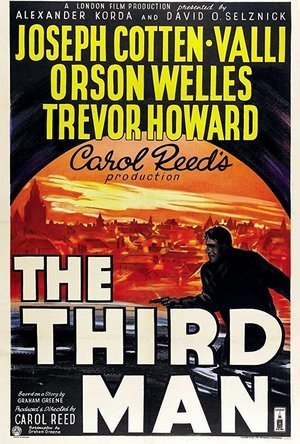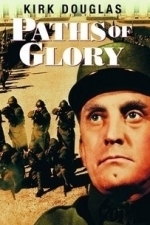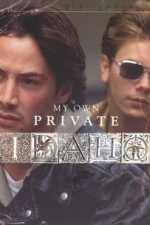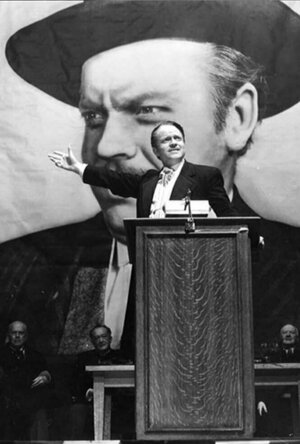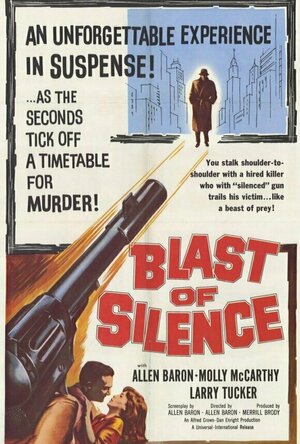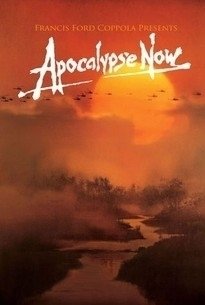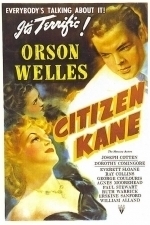Search
Search results
Dick Cavett recommended The Third Man (1949) in Movies (curated)
Paul Morrissey recommended The Third Man (1949) in Movies (curated)
William Friedkin recommended Paths of Glory (1957) in Movies (curated)
James Franco recommended My Own Private Idaho (1991) in Movies (curated)
Lenard (726 KP) rated Mank (2020) in Movies
Dec 6, 2020
David Fincher has spent two decades working to adapt his father's screenplay about Herman Mankiewicz. He succeeded in a major triumph. Gary Oldman plays the alcoholic washed up screenwriter hired by New York wunderkind Orson Welles to write the first draft of the screenplay for his first film. The resulting film, Citizen Kane, would change moviemaking for generations even if the battle to get it made, released, and seen lasted two industry cycles.
Mank is a wonder to behold technically. The production design, editing, and cinematography takes you back to an earlier Hollywood era. Its use of flashback, mirroring Kane, fills in the blank as to how Mank was in this world and why he was willing to burn it. The movie even foreshadows events that would.shape the screenplay Mank is writing.
My greatest pleasure was how its relevance continues today, but without the explicit shoutouts or manipulation of events. Do you know the parable of the organ grinder's monkey? If you don't, Mank tells you, but never exposes the reason it resonates. Also, even if you have seen other works about WRH, you still learn more about him. Mank is great and will get many Oscar nominations. Amanda Seyfried gives Marion Davies the star turn she never had in life.
Mank is a wonder to behold technically. The production design, editing, and cinematography takes you back to an earlier Hollywood era. Its use of flashback, mirroring Kane, fills in the blank as to how Mank was in this world and why he was willing to burn it. The movie even foreshadows events that would.shape the screenplay Mank is writing.
My greatest pleasure was how its relevance continues today, but without the explicit shoutouts or manipulation of events. Do you know the parable of the organ grinder's monkey? If you don't, Mank tells you, but never exposes the reason it resonates. Also, even if you have seen other works about WRH, you still learn more about him. Mank is great and will get many Oscar nominations. Amanda Seyfried gives Marion Davies the star turn she never had in life.
Jeremy Workman recommended Blast of Silence (1961) in Movies (curated)
Ed Helms recommended Apocalypse Now (1979) in Movies (curated)
BankofMarquis (1832 KP) rated Mank (2020) in Movies
Jan 7, 2021
Good companion piece to CITIZEN KANE
Orson Welles’ 1941 masterpiece CITIZEN KANE is truly a remarkable work of art (especially for the time it was created) and it regularly lands in either the #1 or #2 spot on my list of all-time favorite films (battling back and forth with THE GODFATHER - the one that ends up at #1 is usually the one I have watched most recently), so I am a sucker for films that are about (or around) the making of this classic.
And…the Netflix film MANK does not disappoint in this regard.
Starring Oscar winning actor Gary Oldman (he won the Oscar for portraying Sir Winston Churchill in DARKEST HOUR), Mank tells the tale of the writing of the screenplay of CITIZEN KANE by screenwriter Herman Mankiewicz. It is an intriguing story of a self-destructive, alcoholic artist (is there any other kind in this kind of film) that (ultimately) produces one of the best scripts in Hollywood history, despite (or maybe because of) his condition and the people he interacts with along the way.
Directed by David Fincher (FIGHT CLUB) - who is one of my favorite Directors working today - MANK starts slow but brews to a satisfying conclusion as Fincher focuses on the man and the relationships he has with the people around him, rather than the circumstances, which then draws to a forceful conclusion.
Gary Oldman is, of course, stellar as Herman “Mank” Mankiewicz, the writer at the center of the story. This film hinges on this performance as the titular Mank is in almost every scene of this film - and at the beginning I was worried that Fincher was going to let Oldman revert to his “hammy” ways (a very real possibility with Oldman if he is left unchecked by a Director), but Fincher reels Oldman in just enough for him to bring a portrait of a troubled man, who has sold his soul to work and alcohol. This character needs to find that soul if he is to succeed. Since Mank won the Oscar for his screenplay - and I’ve already stated that I think the CITIZEN KANE screenplay is one of the best written of all time - you know how it will turn out, but it is fascinating (and satisfying) to watch Oldman on this journey.
Fincher, of course, is smart enough to surround Oldman with some very good Supporting Actors, most notably the always evil Charles Dance (Tywin Lannister on GAME OF THRONES) as William Randolph Hearst (the inspiration for Charles Foster Kane). Dance spends most of the film observing Mank but in the final “confrontation” scene between the two, the screen sparkles as two wonderful thespians throw down.
Others in the Supporting cast - like Lilly Collins, Tom Burke (as Orson Welles), Jamie McShane and, especially Arliss Howard (as Louis B. Mayer) bring heft and the ability to go “toe to toe” with Oldman, not a small task.
Special notice has to be made of the work of Amanda Seyfried as Marion Davies - Hearst’s mistress and a character that is used as a “throw away toy” in Citizen Kane. Davis and Mank form an interesting bond and the platonic chemistry between Seyfried and Oldman is strong. I gotta admit that when Seyfried first burst on the scene in such films as MAMA MIA and MEAN GIRLS, I figured she was just the “pretty young Rom-Com girl of the time” and would come and go quickly, but she has rounded into a very impressive actress and I can unequivocally state that I was wrong about her. She can act with the best of them.
The Cinematography by Erik Messerschmidt is also a very important part of this film - as he (and Fincher) attempt to recreate in this film the look/feel of CITIZEN KANE and they pull this off very, very well.
If you can get through the slow start of the film - and if you can stomach a protagonist that is not a very nice person in most of this film, than you’ll be rewarded by a rich film experience.
Letter Grade: A-
8 stars (out of10) and you can take that to the Bank(ofMarquis)
And…the Netflix film MANK does not disappoint in this regard.
Starring Oscar winning actor Gary Oldman (he won the Oscar for portraying Sir Winston Churchill in DARKEST HOUR), Mank tells the tale of the writing of the screenplay of CITIZEN KANE by screenwriter Herman Mankiewicz. It is an intriguing story of a self-destructive, alcoholic artist (is there any other kind in this kind of film) that (ultimately) produces one of the best scripts in Hollywood history, despite (or maybe because of) his condition and the people he interacts with along the way.
Directed by David Fincher (FIGHT CLUB) - who is one of my favorite Directors working today - MANK starts slow but brews to a satisfying conclusion as Fincher focuses on the man and the relationships he has with the people around him, rather than the circumstances, which then draws to a forceful conclusion.
Gary Oldman is, of course, stellar as Herman “Mank” Mankiewicz, the writer at the center of the story. This film hinges on this performance as the titular Mank is in almost every scene of this film - and at the beginning I was worried that Fincher was going to let Oldman revert to his “hammy” ways (a very real possibility with Oldman if he is left unchecked by a Director), but Fincher reels Oldman in just enough for him to bring a portrait of a troubled man, who has sold his soul to work and alcohol. This character needs to find that soul if he is to succeed. Since Mank won the Oscar for his screenplay - and I’ve already stated that I think the CITIZEN KANE screenplay is one of the best written of all time - you know how it will turn out, but it is fascinating (and satisfying) to watch Oldman on this journey.
Fincher, of course, is smart enough to surround Oldman with some very good Supporting Actors, most notably the always evil Charles Dance (Tywin Lannister on GAME OF THRONES) as William Randolph Hearst (the inspiration for Charles Foster Kane). Dance spends most of the film observing Mank but in the final “confrontation” scene between the two, the screen sparkles as two wonderful thespians throw down.
Others in the Supporting cast - like Lilly Collins, Tom Burke (as Orson Welles), Jamie McShane and, especially Arliss Howard (as Louis B. Mayer) bring heft and the ability to go “toe to toe” with Oldman, not a small task.
Special notice has to be made of the work of Amanda Seyfried as Marion Davies - Hearst’s mistress and a character that is used as a “throw away toy” in Citizen Kane. Davis and Mank form an interesting bond and the platonic chemistry between Seyfried and Oldman is strong. I gotta admit that when Seyfried first burst on the scene in such films as MAMA MIA and MEAN GIRLS, I figured she was just the “pretty young Rom-Com girl of the time” and would come and go quickly, but she has rounded into a very impressive actress and I can unequivocally state that I was wrong about her. She can act with the best of them.
The Cinematography by Erik Messerschmidt is also a very important part of this film - as he (and Fincher) attempt to recreate in this film the look/feel of CITIZEN KANE and they pull this off very, very well.
If you can get through the slow start of the film - and if you can stomach a protagonist that is not a very nice person in most of this film, than you’ll be rewarded by a rich film experience.
Letter Grade: A-
8 stars (out of10) and you can take that to the Bank(ofMarquis)
Phillip McSween (751 KP) rated Citizen Kane (1941) in Movies
Sep 30, 2019
Beautiful Cinematic Treat
Citizen Kane follows the life of a newspaper tycoon. I saw this movie months ago, but have been dreading the review due to my scoring. Granted, I LOVED this movie, I just know there will be those that say I should have scored the movie higher and I’m ok with that. Here goes nothing…
Acting: 10
Orson Welles delivers a powerful performance as Charles Foster Kane. In my eyes, I see him as the original Tony Stark: Powerful, suave, and undeniably lovable. His presence takes over making it hard for me to remember the impact of other performances. There is no doubt that this is a classic, iconic role.
Beginning: 10
Characters: 10
Again, I could watch a movie made up of just Charles Foster Kane and no one else and still enjoy it. Yes, there were other characters that contributed to the film’s overall impactfulness, but the character of Kane is one you remember for a long time. He is a well-layered powerful man that has a lot brewing beneath the surface. He is compensating for something missing in his life and it doesn’t take us long to see this. His journey is definitely one worth watching.
Cinematography/Visuals: 10
Conflict: 8
Entertainment Value: 10
The entire movie revolves around a mystery: What exactly is rosebud? It takes us all the way to the end to truly find out what that means. I don’t know about you, but I spent much of my time while watching the film trying to find hints to what the mystery could mean. This made the movie all the more interesting and it was a clever way to keep me engaged. This movie doesn’t need a full two hours to pack a powerful punch.
Memorability: 10
Pace: 8
Plot: 10
Resolution: 6
Here’s where i get crucified: I think the ending to Citizen Kane is a bit overrated. When I found out what it all meant, I kind of rolled my eyes a bit. I didn’t hate it, but also didn’t see what the big deal was.
Overall: 92
Citizen Kane definitely deserves its classic status and I agree that, even to this day, it is still one of the best movies ever made. I won’t go as far as to say the greatest movie of all time (as of today it sits at 87 on my list), but it is truly a movie to remember.
Acting: 10
Orson Welles delivers a powerful performance as Charles Foster Kane. In my eyes, I see him as the original Tony Stark: Powerful, suave, and undeniably lovable. His presence takes over making it hard for me to remember the impact of other performances. There is no doubt that this is a classic, iconic role.
Beginning: 10
Characters: 10
Again, I could watch a movie made up of just Charles Foster Kane and no one else and still enjoy it. Yes, there were other characters that contributed to the film’s overall impactfulness, but the character of Kane is one you remember for a long time. He is a well-layered powerful man that has a lot brewing beneath the surface. He is compensating for something missing in his life and it doesn’t take us long to see this. His journey is definitely one worth watching.
Cinematography/Visuals: 10
Conflict: 8
Entertainment Value: 10
The entire movie revolves around a mystery: What exactly is rosebud? It takes us all the way to the end to truly find out what that means. I don’t know about you, but I spent much of my time while watching the film trying to find hints to what the mystery could mean. This made the movie all the more interesting and it was a clever way to keep me engaged. This movie doesn’t need a full two hours to pack a powerful punch.
Memorability: 10
Pace: 8
Plot: 10
Resolution: 6
Here’s where i get crucified: I think the ending to Citizen Kane is a bit overrated. When I found out what it all meant, I kind of rolled my eyes a bit. I didn’t hate it, but also didn’t see what the big deal was.
Overall: 92
Citizen Kane definitely deserves its classic status and I agree that, even to this day, it is still one of the best movies ever made. I won’t go as far as to say the greatest movie of all time (as of today it sits at 87 on my list), but it is truly a movie to remember.
Bob Mann (459 KP) rated Mank (2020) in Movies
Dec 10, 2020
Cinematography - glorious to look at (1 more)
A fabulous ensemble cast, with Oldham, Seyfried, Arliss and Dance excelling
"Mank" is a biopic slice of the career of Herman Jacob Mankiewicz (Gary Oldman), the Hollywood screenwriter who was the pen behind what is regularly voted by critics as being the greatest movie of all time - "Citizen Kane". "Citizen Kane" was written in 1940 (and released the following year) and much of the action in "Mank" takes place in a retreat in the Mojave desert when Mank, crippled by a full-cast on the leg, has been 'sent' by Orson Welles (Tom Burke) to complete the screenplay without alcohol and other worldly distractions. Helping administer to his writing and care needs are English typist Rita Alexander (Lily Collins) and carer Fraulein Freda (Monika Gossmann). However, although Mank produces brilliant stuff, his speed of progress exasperates his 'minder' and editor John Houseman (Sam Troughton). (Yes, THAT John Houseman, the actor.)
In developing the story, we continuously flash-back six years - - nicely indicated by typed 'script notes' - - to 1934 where Mank is working at MGM studios for Louis B. Mayer (Arliss Howard) and mixing in the circles of millionaire publisher William Randolph Hearst (Charles Dance) and his glamorous young wife, actress Marion Davies (Amanda Seyfried). Allegedly, the "Citizen Kane" script was based on Hearst. But what souring of the relationship could have led to such a stinging betrayal during those six years?
Mank has an embarrassment of acting riches. Mankiewicz is a fascinating character: charismatic, reckless, passionate and the definition of a loose cannon. Basically, a dream for a great actor to portray. And Gary Oldham IS a great actor. After doing Churchill in "Darkest Hour", he here turns in a magnificent performance as the alcoholic writer. Never more so than in a furious tirade at a dinner table late in the film, which will likely be the equivalent to the Churchill "tiger" speech come Oscar time. Surely, there's a Best Actor nomination there?
Equally impressive though are some of the supporting cast.
- Tom Burke - so good as TV's "Strike" - gives a fine impersonation of the great Orson Welles: full of confidence and swagger. It's only a cameo role, but he genuinely 'feels' like the young Welles.
- Amanda Seyfried: It took me almost half of the film to recognize her as Marion Davies, and her performance is pitch perfect - the best of her career in my view, and again Oscar-worthy.
- Arliss Howard for me almost steals the show as the megalomaniac Mayer: his introduction to Mank's brother Joe (Tom Pelphrey) has a memorable "walk with me" walkthrough of the studio with Mayer preaching on the real meaning of MGM and the movies in general. Breathtakingly good.
- But - I said "nearly steals the show".... the guy who made off with it in a swag-bag for me was our own Charles Dance as Hearst. Quietly impressive throughout, he just completely nails it with his "organ-grinder's monkey" speech towards the end of the movie. Probably my favourite monologue of 2020. Chilling. I'd really like to see Dance get a Supporting Actor nomination for this.
The screenplay was originally written by director David Fincher's late father Jack. Jack Fincher died in 2002, and this project has literally been decades in the planning. Mankiewicz has a caustic turn of phrase, and there are laugh-out lines of dialogue scattered throughout the script. "Write hard, aim low" implores Houseman at one point. And my personal favourite: Mank's puncturing of the irony that the Screen Writers Guild has been formed without an apostrophe! A huge LOL!
Aside from the witty dialogue, the script has a nuance to the storytelling that continually surprises. A revelation from Freda about Mank's philanthropic tendencies brings you up short in your face-value impression of his character. And the drivers that engineer the rift between Mankiewicz and Hearst - based around the story of the (fictional) director Shelly Metcalf (Jamie McShane) - are not slapped in your face, but elegantly slipped into your subconscious.
In addition, certain aspects are frustratingly withheld from you. Mank's long-suffering wife (a definition of the phrase) Sara (Tuppence Middleton) only occasionally comes into focus. The only reference to his kids are a crash in the background as they "remodel" the family home. Is the charismatic Mank a faithful husband or a philanderer? Is the relationship with Rita Alexander just professional and platonic (you assume so), or is there more going on? There's a tension there in the storytelling that never quite gets resolved: and that's a good thing.
Mank also has an embarrassment of technical riches. Even from the opening titles, you get the impression that this is a work of genius. All in black and white, and with the appearance of 40's titling, they scroll majestically in the sky and then - after "Charles Dance" - effortlessly scroll down to the desert highway. It's evidence of an attention to detail perhaps forced by lockdown. ("MUM - I'm bored". "Go up to your room and do some more work on that movie then".)
It's deliciously modern, yet retro. I love the fact that the cross-reel "circle" cue-marks appear so prominently... the indicators that the projectionist needs to spin up the next reel. I think they are still used in most modern films, but not as noticeably as in the old films... and this one!
A key contributor to the movie is cinematographer Erik Messerschmidt. Everything looks just BEAUTIFUL, and it is now a big regret that I didn't go to watch this on the big screen after all. Surely there will be a cinematography Oscar nomination for this one. Unbelievably, this is Messerschmidt's debut feature as director of cinematography!
Elsewhere, you can imagine multiple other technical Oscar noms. The tight and effective editing is by Kirk Baxter. And the combination of the glorious production design (Donald Graham Burt) and the costume design (Trish Summerville) make the movie emanate the same nostalgia for Hollywood as did last year's "Once Upon a Time... In Hollywood".... albeit set forty years earlier. Even the music (by the regular team of Trent Reznor and Atticus Ross) might get nominated, since I had to go back and check that it actually HAD music at all: it's subtly unobtrusive and effective.
The only area I had any issue with here was the sound mixing, since I had trouble picking up some of the dialogue.
Although I can gush about this movie as a technical work of art, I'm going to hold off a 10* review on this one. For one reason only. I just didn't feel 100% engaged with the story (at least with a first watch). The illustrious Mrs Movie Man summed it up with the phrase "I just didn't care enough what happened to any of the characters". I think though that this one is sufficiently subtle and cerebral that it deserves another watch.
Will it win Oscars. Yes, for sure. Hell, I would like to put a bet on that "Mank" will top the list of the "most nominations" when they are announced. (Hollywood likes nothing more than a navel-gazing look at its history of course). And an obvious nomination here will be David Fincher for Best Director. But, for me, this falls into a similar bucket as that other black and white multi-Oscar winner of two year's ago "Roma". It's glorious to look at; brilliantly directed; but not a movie I would choose to readily reach for to repeatedly watch again.
(For the full graphical review, please check out the review here - https://bob-the-movie-man.com/2020/12/10/mank-divines-for-oscar-gold-in-a-sea-of-pyrites/. Thanks.)
In developing the story, we continuously flash-back six years - - nicely indicated by typed 'script notes' - - to 1934 where Mank is working at MGM studios for Louis B. Mayer (Arliss Howard) and mixing in the circles of millionaire publisher William Randolph Hearst (Charles Dance) and his glamorous young wife, actress Marion Davies (Amanda Seyfried). Allegedly, the "Citizen Kane" script was based on Hearst. But what souring of the relationship could have led to such a stinging betrayal during those six years?
Mank has an embarrassment of acting riches. Mankiewicz is a fascinating character: charismatic, reckless, passionate and the definition of a loose cannon. Basically, a dream for a great actor to portray. And Gary Oldham IS a great actor. After doing Churchill in "Darkest Hour", he here turns in a magnificent performance as the alcoholic writer. Never more so than in a furious tirade at a dinner table late in the film, which will likely be the equivalent to the Churchill "tiger" speech come Oscar time. Surely, there's a Best Actor nomination there?
Equally impressive though are some of the supporting cast.
- Tom Burke - so good as TV's "Strike" - gives a fine impersonation of the great Orson Welles: full of confidence and swagger. It's only a cameo role, but he genuinely 'feels' like the young Welles.
- Amanda Seyfried: It took me almost half of the film to recognize her as Marion Davies, and her performance is pitch perfect - the best of her career in my view, and again Oscar-worthy.
- Arliss Howard for me almost steals the show as the megalomaniac Mayer: his introduction to Mank's brother Joe (Tom Pelphrey) has a memorable "walk with me" walkthrough of the studio with Mayer preaching on the real meaning of MGM and the movies in general. Breathtakingly good.
- But - I said "nearly steals the show".... the guy who made off with it in a swag-bag for me was our own Charles Dance as Hearst. Quietly impressive throughout, he just completely nails it with his "organ-grinder's monkey" speech towards the end of the movie. Probably my favourite monologue of 2020. Chilling. I'd really like to see Dance get a Supporting Actor nomination for this.
The screenplay was originally written by director David Fincher's late father Jack. Jack Fincher died in 2002, and this project has literally been decades in the planning. Mankiewicz has a caustic turn of phrase, and there are laugh-out lines of dialogue scattered throughout the script. "Write hard, aim low" implores Houseman at one point. And my personal favourite: Mank's puncturing of the irony that the Screen Writers Guild has been formed without an apostrophe! A huge LOL!
Aside from the witty dialogue, the script has a nuance to the storytelling that continually surprises. A revelation from Freda about Mank's philanthropic tendencies brings you up short in your face-value impression of his character. And the drivers that engineer the rift between Mankiewicz and Hearst - based around the story of the (fictional) director Shelly Metcalf (Jamie McShane) - are not slapped in your face, but elegantly slipped into your subconscious.
In addition, certain aspects are frustratingly withheld from you. Mank's long-suffering wife (a definition of the phrase) Sara (Tuppence Middleton) only occasionally comes into focus. The only reference to his kids are a crash in the background as they "remodel" the family home. Is the charismatic Mank a faithful husband or a philanderer? Is the relationship with Rita Alexander just professional and platonic (you assume so), or is there more going on? There's a tension there in the storytelling that never quite gets resolved: and that's a good thing.
Mank also has an embarrassment of technical riches. Even from the opening titles, you get the impression that this is a work of genius. All in black and white, and with the appearance of 40's titling, they scroll majestically in the sky and then - after "Charles Dance" - effortlessly scroll down to the desert highway. It's evidence of an attention to detail perhaps forced by lockdown. ("MUM - I'm bored". "Go up to your room and do some more work on that movie then".)
It's deliciously modern, yet retro. I love the fact that the cross-reel "circle" cue-marks appear so prominently... the indicators that the projectionist needs to spin up the next reel. I think they are still used in most modern films, but not as noticeably as in the old films... and this one!
A key contributor to the movie is cinematographer Erik Messerschmidt. Everything looks just BEAUTIFUL, and it is now a big regret that I didn't go to watch this on the big screen after all. Surely there will be a cinematography Oscar nomination for this one. Unbelievably, this is Messerschmidt's debut feature as director of cinematography!
Elsewhere, you can imagine multiple other technical Oscar noms. The tight and effective editing is by Kirk Baxter. And the combination of the glorious production design (Donald Graham Burt) and the costume design (Trish Summerville) make the movie emanate the same nostalgia for Hollywood as did last year's "Once Upon a Time... In Hollywood".... albeit set forty years earlier. Even the music (by the regular team of Trent Reznor and Atticus Ross) might get nominated, since I had to go back and check that it actually HAD music at all: it's subtly unobtrusive and effective.
The only area I had any issue with here was the sound mixing, since I had trouble picking up some of the dialogue.
Although I can gush about this movie as a technical work of art, I'm going to hold off a 10* review on this one. For one reason only. I just didn't feel 100% engaged with the story (at least with a first watch). The illustrious Mrs Movie Man summed it up with the phrase "I just didn't care enough what happened to any of the characters". I think though that this one is sufficiently subtle and cerebral that it deserves another watch.
Will it win Oscars. Yes, for sure. Hell, I would like to put a bet on that "Mank" will top the list of the "most nominations" when they are announced. (Hollywood likes nothing more than a navel-gazing look at its history of course). And an obvious nomination here will be David Fincher for Best Director. But, for me, this falls into a similar bucket as that other black and white multi-Oscar winner of two year's ago "Roma". It's glorious to look at; brilliantly directed; but not a movie I would choose to readily reach for to repeatedly watch again.
(For the full graphical review, please check out the review here - https://bob-the-movie-man.com/2020/12/10/mank-divines-for-oscar-gold-in-a-sea-of-pyrites/. Thanks.)
